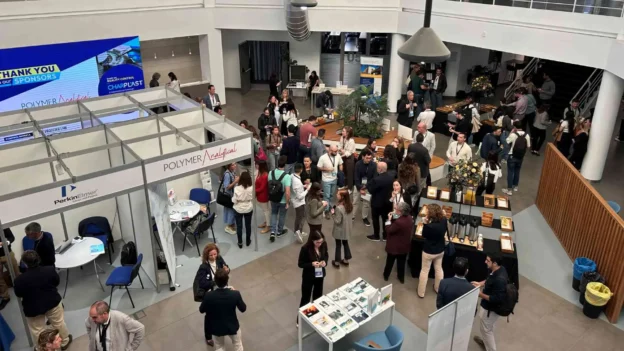The city of Valencia hosted the second edition of CHARPLAST, the International Seminar on Plastic Characterization, organized by AIMPLAS, the Plastics Technology Center.
The event brought together nearly one hundred experts from around the world to discuss the latest analytical techniques applied to the study of plastics, their environmental impact and the challenges in the context of the circular economy.
Advanced techniques and challenges in plastics characterization
During the first thematic block, the complexities inherent to the characterization of nanoplastics and the absence of standardized methodologies were addressed. Víctor Ruiz Paula, from AIMPLAS, proposed the application of artificial intelligence and combined methods to overcome these limitations.
Michael Soll, from Frontier Lab, shared practical analysis with pyrolysis-GC/MS, while Gonzalo Anguera, from Waters-Ta Instruments, presented improvements in thermogravimetry applied to material lifetime prediction. Laura Santonja, from Polymer Char, explained how microstructure influences the performance of polyethylene and polypropylene.
Sustainability issues were at the center of the debate. Aleks Koprivc, from Zwick Roell, spoke about the effects of hydrogen in polymers. Andrej Holobar of EchoInstruments discussed methodologies for accelerated biodegradation accelerated biodegradation study, while Sergio Mayor, from AIMPLAS, spoke about the implementation of closed recycling cycles in the automotive sector.
In the block on environmental monitoring, Dyana Vitale, from AIMPLAS, presented solutions for the detection of emerging contaminants, highlighting the role of citizen science. Roberto Ferrero Guerra, from Perkin Elmerexplained the routine use of FTIR microspectroscopy and Ángela Acebrón Regidor, from the University of Valencia, presented data on the analysis of wastewater in the city.
The use of AI was the protagonist on the second day. Joan Giner, from AIMPLAS, detailed how machine learning can predict properties of plastics with high accuracy, while Jordi Cirujeda, from Tyris AI, showed machine vision applications to separate waste. Giovanni Gadaleta presented results from the CARACT4BIO project on bioplastics, and Rafael García Meseguer, from ProtoQSAR, addressed toxicological prediction using QSAR models.
The closing of the seminar focused on industrial experiences. Leire Ruiz Rubio, from UPV/EHU, presented the SYMBIOREM project, based on bioremediation. César Gadea, from AIMPLAS, shared successful cases of solving industrial problems through characterization. Luis Spencer Lima, from PARALAB, and José Badia, from the University of Valencia, delved into thermal analysis and its role in mechanical recycling.
The second edition of CHARPLAST highlighted the importance of synergy between industry, academia and technology centers to meet the challenges of sustainability, regulatory standards and quality in plastic materials.
This event was supported by companies such as Polymer Analytical, Echo Instruments, Netzsch, Perkin Elmer, Zwick/Roell, Control Técnica, Frontier Lab and Waters – Ta. Visits to technical facilities and the exhibition area strengthened knowledge transfer and the generation of professional collaboration networks.
Source and photo: AIMPLAS

